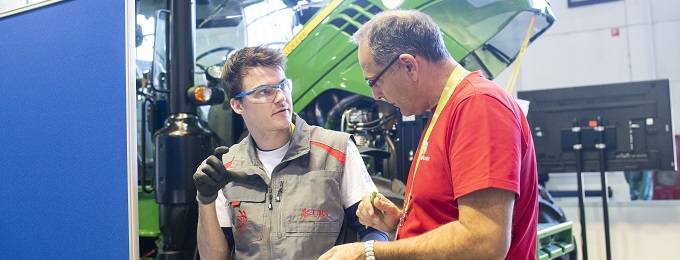The Council Recommendation on VET together with the Osnabrück Declaration will lead the way to recovery and support the green and digital transitions.
With the COVID-19 pandemic heavily disrupting education and training, the task of making vocational education and training (VET) future-proof has received special attention on the EU agenda in 2020. A priority under the German Council Presidency, actions to up- and reskill the workforce of Europe lie at the heart of a number of recent EU initiatives such as the updated European Skills Agenda, the reinforced Youth Guarantee (see SwissCore article), the renewed European Alliance for Apprenticeships and the launch of the Pact for Skills (see SwissCore article). The latest milestones to make VET fit to support the recovery as well as the green and digital transitions include the adoption of the Council Recommendation on VET and the endorsement of the Osnabrück Declaration.
On 24 November 2020, the Council adopted an EC proposal for a Council Recommendation on VET for sustainable competitiveness, social fairness and resilience, which was presented in July 2020 as part of one of the twelve key actions under the Skills Agenda. It aims at equipping young people and adults with the knowledge and skills needed to become more resilient against challenges such as the evolving labour market, the Corona crisis and demographic change while at the same time fostering inclusiveness and equal opportunities. European VET systems should focus on the learner and offer flexible pathways to women and men of all ages to become more modern, attractive and agile. In order to act as a driver for innovation and growth and to support the green and digital transitions, VET programmes should foster the acquisition of entrepreneurial, green and digital skills. EU funding can support not only the digital readiness of VET institutions, but also the mobility of learners as well as teachers and trainers. The Council Recommendation sets concrete goals to be achieved by 2025: More than four out of five VET graduates should be employed after their studies, and 8% of VET learners should benefit from a learning mobility abroad. Moreover, it foresees the establishment of 50 Centres of Vocational Excellence (CoVEs, see SwissCore article), which will serve as global reference point for initial training as well as lifelong learning.
In order to complement and operationalise the vision and strategic objectives of the Council Recommendation, on 30 November 2020, Ministers for VET of the EU Member States, the EU Candidate Countries and the EEA-EFTA countries as well as European social partners and the EC endorsed a set of policy actions laid out in the Osnabrück Declaration. Supported by EU training associations and learners’ organisations, the Declaration highlights in particular the need for social dialogue and the active involvement of a broad range of stakeholders. Apart from VET providers, social partners, employers’ organisations and public institutions, the companies in particular play a crucial role in making VET excellent and inclusive as they transmit the skills of tomorrow to learners.
The signatories of the Declaration agreed on implementing measures by 2025 along four key objectives, namely 1. building resilience and excellence through quality, inclusive and flexible VET; 2. establishing a new lifelong learning culture with a special focus on continuing VET (CVET) and digitalisation; 3. promoting sustainability; 4. developing a European Education and Training area and strengthening the international dimension of VET. Supporting measures on EU level include, among others, the promotion of the exchange of green and digital practices, the further development of CoVEs, the improvement of statistics and the exploration of incentives to encourage individual learning. Further actions shall tackle the reinforcement of VET mobility, the assessment and development of digital tools such as eTwinning, EPALE and Europass, the participation in international skills competitions and international cooperation. On the national level, actions aim to address the development of digital infrastructure and learning solutions, the reinforcement of work-based learning and apprenticeships, and the development of intelligence systems including skills anticipation and graduate tracking. In addition, they focus on the development of national strategies for quality and inclusive lifelong learning, the formulation of outreach strategies, the creation of incentives for greening VET programmes, the support of VET mobility and internationalisation of VET.
The Osnabrück Declaration provides a new impetus for the Copenhagen Process, the European strategy for enhanced cooperation in VET launched in 2002. It builds on past agreements on cooperation in VET and replaces the five-year roadmap outlined in the Riga Conclusions in 2015.
Skills and competences as well as lifelong learning will remain key priorities on the agenda of the upcoming Portuguese Council Presidency, which will assume its role starting from 1 January 2021 for the duration of six months.

